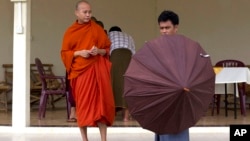Burma has banned distribution of a Time Magazine cover story that portrays a fundamentalist Burmese monk as an inciter of terrorism against Muslims.
In a statement late Tuesday, the Burmese government said the ban is aimed at preventing a recurrence of violence between majority Buddhists and minority Muslims.
The magazine cover features a photo of the fundamentalist monk known as Wirathu, with the words "The Face of Buddhist Terror."
Officials said a committee investigating recent Buddhist-Muslim violence made the decision to block the magazine cover and accompanying article. It is not clear whether the rest of Time Magazine's latest issue will be distributed in Burma.
Radical monks, such as Wirathu, have been urging Burmese Buddhists to boycott Muslim-owned businesses and avoid marriages with Muslims. His critics say the boycott appeals have encouraged Buddhist extremists to commit violence against Muslims.
Wirathu insists he is a man of peace. Many Buddhists have objected to the Time Magazine story, saying it distorts the peaceful nature of their faith.
Wirathu was jailed in 2003 for inciting deadly anti-Muslim riots, but was released in 2012 as part of a general amnesty. Some analysts say new freedoms of speech introduced in Burma since the end of military-rule have made it easier for radicals to promote their views.
Deadly confrontations between Burmese Buddhists and Muslims have killed more than 200 people in the past year, most of them Muslims.
In a statement late Tuesday, the Burmese government said the ban is aimed at preventing a recurrence of violence between majority Buddhists and minority Muslims.
The magazine cover features a photo of the fundamentalist monk known as Wirathu, with the words "The Face of Buddhist Terror."
Officials said a committee investigating recent Buddhist-Muslim violence made the decision to block the magazine cover and accompanying article. It is not clear whether the rest of Time Magazine's latest issue will be distributed in Burma.
Radical monks, such as Wirathu, have been urging Burmese Buddhists to boycott Muslim-owned businesses and avoid marriages with Muslims. His critics say the boycott appeals have encouraged Buddhist extremists to commit violence against Muslims.
Wirathu insists he is a man of peace. Many Buddhists have objected to the Time Magazine story, saying it distorts the peaceful nature of their faith.
Wirathu was jailed in 2003 for inciting deadly anti-Muslim riots, but was released in 2012 as part of a general amnesty. Some analysts say new freedoms of speech introduced in Burma since the end of military-rule have made it easier for radicals to promote their views.
Deadly confrontations between Burmese Buddhists and Muslims have killed more than 200 people in the past year, most of them Muslims.
Some information for this report was provided by AP and AFP.





